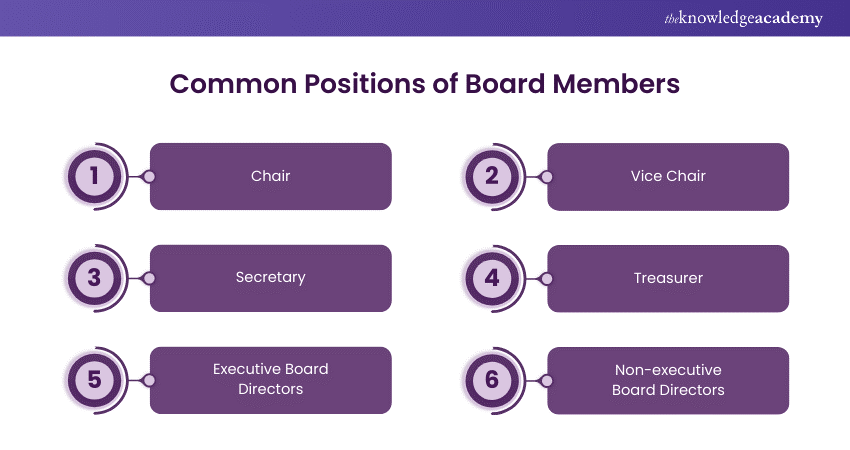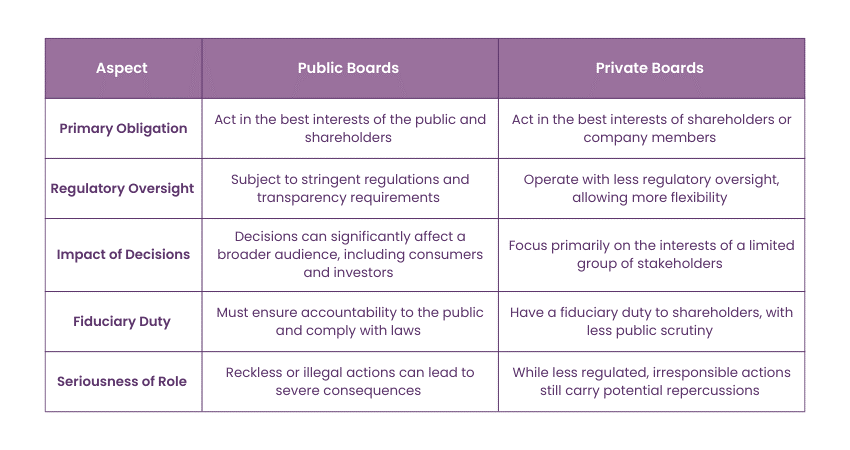We may not have the course you’re looking for. If you enquire or give us a call on +44 1344 203 999 and speak to our training experts, we may still be able to help with your training requirements.
We ensure quality, budget-alignment, and timely delivery by our expert instructors.

Imagine sitting at a polished boardroom table, where your insights shape an organisation’s future. Does this dream still feel out of reach? If so, you’re about to embark on an exciting journey! This blog will guide you through the pathway to How to Become a Board Member, highlighting essential skills, the power of networking, and strategic insight. Get ready to unlock your potential and drive meaningful change from within!
Table of Contents
1) What is a Board Member?
2) Steps to Becoming a Board Member
3) Typical Roles of Board Members
4) Daily Responsibilities of a Board Member
5) Public vs Private Boards: Key Differences
6) Conclusion
What is a Board Member?
A Board Member plays a crucial role in an organisation’s board of directors, whether in a corporate or nonprofit setting. They are responsible for shaping strategy, ensuring financial stability, and guiding the overall direction. Board Members may have specialised roles with specific responsibilities or serve as at-large members with more flexible duties, including evaluating senior management on the executive board. A key part of this role involves participating in Board Evaluation to assess the effectiveness of the board and its individual members.
Key Points:
a) Strategic Influence: Board Members shape the organisation’s strategy and direction.
b) Financial Oversight: They ensure the financial stability of the organisation.
c) Role Diversity: Members may hold specialised roles or serve as at-large members.
d) Appointment Process: Governed by bylaws involving elections or appointments.
e) Compensation: Varies by organisation, with some offering compensation and others relying on volunteers. Compensation is typically determined by an in-house committee.
Steps to Becoming a Board Member
Explore these essential steps to becoming a Board Member and unlock your potential to shape your organisation's future:
1) Gain Relevant Experience
Standing Board Members greatly value candidates with relevant experience. While becoming a Board Member without an extensive background is possible, a proven track record instils confidence in organisations that you understand the role's demands and can effectively contribute to their mission. Leadership Team Development can also help you refine the strategic skills required for such a role.
You can showcase your passion for the field in various ways, including holding leadership positions, participating in workshops or conferences, and obtaining additional degrees or certifications.
2) Build a Strong Professional Network
While studying Board Members' duties, qualifications, and expectations is valuable, networking is the most effective way to learn. Attend industry conferences, join relevant associations, and connect with professionals currently serving on boards or in your area of interest. Building relationships with existing Board Members can create opportunities for future involvement and mentorship.
3) Craft a Compelling Value Proposition
Board Member positions are competitive, so it’s essential to identify and cultivate specific skills that demonstrate your value to organisations. Develop a clear value proposition highlighting what you can contribute as a Board Member.
Identify your unique strengths—such as financial acumen, leadership abilities, or industry expertise—and tailor your value proposition to align with the organisation's specific needs. This targeted approach will help you distinguish yourself as a strong candidate.
4) Find Open Board Positions
Once you’ve assessed your qualifications and readiness for a board position, you can begin the formal application process.
Start by researching board openings that align with your expertise and interests. Nonprofits, corporate boards, and industry-specific organisations frequently list vacancies. Additionally, tap into your network for potential leads or use professional services that connect candidates with board opportunities.
5) Engage in the Selection Process
Becoming a Board Member involves more than expressing interest; it includes a thorough interview process. This allows leaders, such as the board chair or executive director, to understand candidates beyond their applications. Depending on the number of applicants, interviews may be limited to top candidates or open to all.
Transform your leadership skills—join our Managing Remote Teams training today!
Typical Roles of Board Members
A board of directors typically comprises various roles, each overseeing specific aspects of the organisation. These roles may vary based on the company's needs. Here are some of the most common positions filled by Board Members:

a) Chair: Leads the board of directors, facilitating meetings and supervising the chief executive's performance.
b) Vice Chair: Assists the chair in leading the board and steps in when the chair is unavailable.
c) Secretary: Manages and records board meetings and official documents, ensuring the leadership team meets ethical and legal obligations.
d) Treasurer: Oversees the organisation's financial management strategy and ensures compliance with financial reporting requirements.
e) Executive Board Directors: Hold executive roles within the organisation, linking the board and daily operations.
f) Non-executive Board Directors: Not involved in daily operations, these members provide independent oversight and strategic guidance regarding the organisation’s performance.
Daily Responsibilities of a Board Member
While exact responsibilities can vary based on an individual’s role on the board, several everyday duties are expected of most Board Members. These include:
a) Setting a Strategic Vision: Contributing to developing and conveying the organisation's long-term goals.
b) Attending Board Meetings: Participating in regular meetings to discuss and decide on key issues.
c) Appointing and Monitoring Executives: Selecting executive leadership and assessing their performance to ensure alignment with the organisation’s objectives.
d) Guiding Organisational Decision-making: Providing insights and perspectives that inform critical decisions affecting the organisation.
e) Collaborating with Board Members and Executives: Working closely with fellow Board Members and executives to foster a cohesive governance structure.
f) Maintaining Legal, Ethical, and Financial Responsibilities: Ensuring compliance with laws and regulations and upholding the organisation’s ethical standards.
g) Reviewing Budgets and Assessing Projects: Analysing financial plans and evaluating the viability of proposed initiatives.
h) Representing the Organisation at Events: Acting as an ambassador for the organisation at public events and networking opportunities.
Public vs Private Boards: Key Differences
Here’s a table that summarises the differences between sitting on a public versus a private board:

Kickstart your management journey—Join our Introduction to Management Course today!
Conclusion
Learning How to Become a Board Member implies comprehending the roles, networking with industry experts, and generating a clear value proposition. Acquiring appropriate experience, analysing opportunities, and preparing for the interview process can position you as a strong candidate. Remember, each step you take brings you closer to that polished boardroom table where your insights will make a significant impact.
Elevate your leadership skills—Join our Certified Artificial Intelligence for Managers Training today!
Frequently Asked Questions
Who is Eligible for the Board of Directors?

Eligibility typically includes individuals with relevant experience, skills, or expertise. Generally, candidates should understand the organisation’s industry and demonstrate leadership capabilities, often requiring background checks and adherence to legal and ethical standards.
What Is the Salary of a Board of Directors?

Board Member salaries vary widely based on the organisation's size, type, and location. Compensation may range from nominal fees for nonprofits to substantial wages and stock options in public corporations, reflecting the member's experience and the board's responsibilities.
What are the Other Resources and Offers Provided by The Knowledge Academy?

The Knowledge Academy takes global learning to new heights, offering over 3,000 online courses across 490+ locations in 190+ countries. This expansive reach ensures accessibility and convenience for learners worldwide.
Alongside our diverse Online Course Catalogue, encompassing 19 major categories, we go the extra mile by providing a plethora of free educational Online Resources like News updates, Blogs, videos, webinars, and interview questions. Tailoring learning experiences further, professionals can maximise value with customisable Course Bundles of TKA.
What is The Knowledge Pass, and How Does it Work?

The Knowledge Academy’s Knowledge Pass, a prepaid voucher, adds another layer of flexibility, allowing course bookings over a 12-month period. Join us on a journey where education knows no bounds.
What are Related Courses and Blogs Provided by The Knowledge Academy?

The Knowledge Academy offers various Management Courses, including the Directors Development Training, Management Training for New Managers and the Introduction to Managing People Course. These courses cater to different skill levels, providing comprehensive insights into Cost Accounting and Management Accounting.
Our Business Skills Blogs cover a range of topics related to Management, offering valuable resources, best practices, and industry insights. Whether you are a beginner or looking to advance your Management Skills, The Knowledge Academy's diverse courses and informative blogs have got you covered.
Upcoming Business Skills Resources Batches & Dates
Date
 Directors Development Training Course
Directors Development Training Course
Thu 20th Mar 2025
Thu 8th May 2025
Thu 17th Jul 2025
Thu 25th Sep 2025
Thu 6th Nov 2025
Thu 13th Nov 2025






 Top Rated Course
Top Rated Course



 If you wish to make any changes to your course, please
If you wish to make any changes to your course, please


